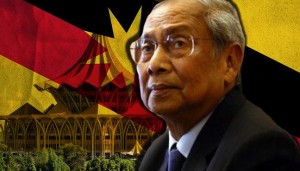Nothing has changed after May 7
Lim Sue Goan, Sin Chew Daily
People holding different political stands will interpret the outcome of the 11th Sarawak state election in very different ways. To BN supporters, the most reassuring fact is that some 5-10 per cent of urban and Chinese voters have returned to BN. But to me, there hasn’t been any significant change to the existing political situation.
By no significant change I mean rural and indigenous constituencies remain BN’s stronghold while the opposition can only cling on to its existing seats and PAS continues to be rejected by the state’s electorate. Simply put, Sarawak remains very much BN’s “fixed deposit state” after the election.
Another unchanging trend is that the voter turnout in urban constituencies remains low, especially in the Chinese community. This shows that the erstwhile enthusiasm has cooled off remarkably after the 2013 general elections.
Pakatan Harapan claims that it has won more votes in indigenous constituencies but statistics show that BN bags 475,264 votes, 99,990 more than in 2011, while Pakatan only managed 230,323 (28.74 per cent of total), lower than the 31,170 votes it won five years ago at 38.41 per cent.
As such, even if there is any increase in Bumi votes for Pakatan this time, the quantum is negligible.
PBB and PRS have clean sweeps this time, and this illustrates the fact that the opposition still has a lot of work to do to register its presence in the interior Bumi areas, including establishing its grassroots power and expanding its network.
In addition, voter turnout has been on the slide since the Kajang by-election. During the 2013 general elections, Kajang boasted an impressive voter turnout of 88.4 per cent, dwindling to a mere of 72 per cent in the by-election. As for Bukit Gelugor, it’s 86.3 per cent against 56.04 per cent and Teluk Intan 80.4 per cent against 67.4 per cent.
The voter turnout for this year’s Sarawak election is 70.1 per cent (Lim Kit Siang claims that it’s only 68.1 per cent). EC chairman Mohd Hashim Abdullah has said the turnout in some urban constituencies has been relatively low compared to rural consistencies, and this is one of the reasons DAP has lost some of its seats, as in the case of Teluk Intan.
The opposition only has itself to blame for the lack of interest among urban voters. Incidents such as the Selangor MB crisis, intentionally created Kajang by-election, DAP-PAS rift and the collapse of Pakatan Rakyat, among others, have frustrated many opposition supporters who have decided to give up their rights to vote.
Neither DAP nor PKR has picked up a lesson this time. The six overlapping constituencies have further dampened the confidence of voters.
If the voter turnout for urban and mixed constituencies is going to remain low come the next general elections, there will be little hope Pakatan Harapan will wrestle the federal administrative power from the BN.
That said, it is quite hard for the opposition parties to mend the rift within a short time. In its stead, the situation could get worse. For instance, after the defeat in Sarawak, PKR deputy president Azmin Ali has extended an invitation to PAS for a tie-up with PH without taking into consideration the feelings of the Chinese community.
The upcoming by-elections for Sungai Besar and Kuala Kangsar parliamentary seats are expected to be yet another battle involving several opposition candidates against a single BN candidate in each. PAS used to run in these two elections and the party is most definitely going to field its own candidates this time.
As for Amanah — a splinter unit of PAS — the party is not expected to concede this easily and will field its own candidates as well. The three-cornered fight will invariably work to the favour of BN.
Sarawak DAP chairman Chong Chieng Jen has said the latest election outcome puts the party a decade back to the year of 2006, which should sound an alarm bell that Sarawak politics has indeed receded.
Another disenchanting development is that the BN on Peninsular Malaysia has started talking about duplicating the “Adenan Model” in hope of revitalising itself. The question is: Why should good governance be duplicated instead of being institutionalised?
By institutionalisation, I mean legislating to outlaw racist politics and discrimination, incorporating schools of different language streams into the country’s mainstream education policy and institutionalising educational allocations, among others.
Effectuating politics for all Malaysians through one or two individuals will never be a long-term solution to our problems. Any leader can come and go any time, but only the system will last.
BN in West Malaysia is now talking about the Adenan Model in hope of getting Umno to lead the change. As a matter of fact, the greatest sorrow of BN through its decades of existence has been its failure to identify a distinct roadmap for itself.
Both the BN and opposition are still shaky in the absence of a powerful political resolution to chart their own ways. This also explains why there has been very little progress in national politics all the years as politicians are still calculating their individual gains.


